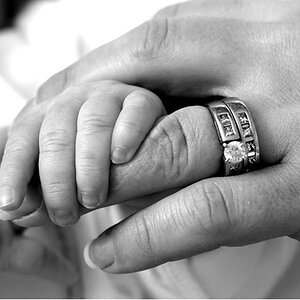donny1963
No longer a newbie, moving up!
- Joined
- Dec 15, 2015
- Messages
- 372
- Reaction score
- 30
- Can others edit my Photos
- Photos NOT OK to edit
Here is a subject that is in the courts today, there are tons of court cases being tried in civil litigation, that may interest you photographers who plan to publish their work.
The Subject is Models with Custom Design Tattoo's, this doesn't apply to Flash Art Tattoo's
Lets say a model has a unique design tattoo on her body, and She is to appear in Vogue Magazine or some other publication commercial print, and the picture of the model is taken, and the
Custom Tattoo Is Displayed.
This could cause a problem for Vogue Magazine or who ever intends to publish such photography.
WHY?
Well the Model can sign a model release to get her picture published, but what about the Ink Art?
the artist who designed this ink and placed it on the model is the original copyright holder of this art, So can the publishing company legally print this picture with the tattoo art showing without expressed permission of the tattoo artist With out a lawsuit?
Right now the answer is unknown, because this very same type of case is now in civil federal court.
it seems a famous model had her picture published in the nude, with this tattoo art clearly displayed..
The argument in court is the tattoo artist didn't give this publishing company permission rights to print such art that the tattoo artist owns..
So if the courts go in favor of the tattoo artist this could change Commercial photograph and Even Movie & TV for ever, no movie production would legally be able to cast an actress or actor in a move or TV show with any of their custom art tattoos' displayed with out paying off the tattoo artist..
Now so far the lawyers are fighting this out, one lawyer is saying the tattoo artist should not be able to invoke copyright's for printing such art on a canvas they don't own,
Such as a human being, and such art was printed on a person for public display and forfeits all copyright ownership in that aspect, Just as in a case back in 1979 came up where a graffiti artist took Gabe Kaplan, the creator of welcome back kotter tv show to civil court claiming the graffiti was his art work and didn't get permission to record this on film for public broadcasting.
The federal case was take out in 1979, the actual recording of the graffiti was recorded in 1974
this graffiti was drawn on a subway car in the begining of the intro of the Tv Show.
The graffiti artist lost the case, where the judge claimed that the artist had no claim to any created art for the reason that the art was created on a canvas that this artist didn't own, also the fact that the artist created the art on a public venue where it was intended to be displayed in public making any recording or photography of such art fair use.
This argument may take a play in Body art where the artist does not own the canvas ( human being) and intended for public display and making any recorded video or photograph a fair use even tho the picture would be used commercially.
Welcome back kotter tv show had created an intro for the TV show where 90% of it was recorded in public in the city of New York making any such recorded film fair use.
Such Body Art may be seen in the same manor..
How ever if the courts favor in the tattoo artist case, this could change photographing models or casting actors / actress in Movies or TV show with such body art in display..
For instance, jason statham has appeared in many motion pictures, and has some custom body art, will the artist of such ink be able to claim Damages for having them appear in these movies with out express written permission, time will only tell what the outcome will be..
NOTE: they was a law suit just like this, with Mike Tyson, where is body art on his face was re-created on another actor for a move ..
he man who gave Mike Tyson his distinctive facial tattoo has
sued Warner Bros. over the similar-looking facial art on Ed Helms' character in the upcoming The Hangover: Part II.
So what will happen, Can a photographer take a picture of a model in the nude with her custom tattoo's showing in the picture with out the dangers of being taken to civil court?
as i said time will tell, and this may change the way commercial photography with models who have tattoo's forever..
The Subject is Models with Custom Design Tattoo's, this doesn't apply to Flash Art Tattoo's
Lets say a model has a unique design tattoo on her body, and She is to appear in Vogue Magazine or some other publication commercial print, and the picture of the model is taken, and the
Custom Tattoo Is Displayed.
This could cause a problem for Vogue Magazine or who ever intends to publish such photography.
WHY?
Well the Model can sign a model release to get her picture published, but what about the Ink Art?
the artist who designed this ink and placed it on the model is the original copyright holder of this art, So can the publishing company legally print this picture with the tattoo art showing without expressed permission of the tattoo artist With out a lawsuit?
Right now the answer is unknown, because this very same type of case is now in civil federal court.
it seems a famous model had her picture published in the nude, with this tattoo art clearly displayed..
The argument in court is the tattoo artist didn't give this publishing company permission rights to print such art that the tattoo artist owns..
So if the courts go in favor of the tattoo artist this could change Commercial photograph and Even Movie & TV for ever, no movie production would legally be able to cast an actress or actor in a move or TV show with any of their custom art tattoos' displayed with out paying off the tattoo artist..
Now so far the lawyers are fighting this out, one lawyer is saying the tattoo artist should not be able to invoke copyright's for printing such art on a canvas they don't own,
Such as a human being, and such art was printed on a person for public display and forfeits all copyright ownership in that aspect, Just as in a case back in 1979 came up where a graffiti artist took Gabe Kaplan, the creator of welcome back kotter tv show to civil court claiming the graffiti was his art work and didn't get permission to record this on film for public broadcasting.
The federal case was take out in 1979, the actual recording of the graffiti was recorded in 1974
this graffiti was drawn on a subway car in the begining of the intro of the Tv Show.
The graffiti artist lost the case, where the judge claimed that the artist had no claim to any created art for the reason that the art was created on a canvas that this artist didn't own, also the fact that the artist created the art on a public venue where it was intended to be displayed in public making any recording or photography of such art fair use.
This argument may take a play in Body art where the artist does not own the canvas ( human being) and intended for public display and making any recorded video or photograph a fair use even tho the picture would be used commercially.
Welcome back kotter tv show had created an intro for the TV show where 90% of it was recorded in public in the city of New York making any such recorded film fair use.
Such Body Art may be seen in the same manor..
How ever if the courts favor in the tattoo artist case, this could change photographing models or casting actors / actress in Movies or TV show with such body art in display..
For instance, jason statham has appeared in many motion pictures, and has some custom body art, will the artist of such ink be able to claim Damages for having them appear in these movies with out express written permission, time will only tell what the outcome will be..
NOTE: they was a law suit just like this, with Mike Tyson, where is body art on his face was re-created on another actor for a move ..
he man who gave Mike Tyson his distinctive facial tattoo has
sued Warner Bros. over the similar-looking facial art on Ed Helms' character in the upcoming The Hangover: Part II.
So what will happen, Can a photographer take a picture of a model in the nude with her custom tattoo's showing in the picture with out the dangers of being taken to civil court?
as i said time will tell, and this may change the way commercial photography with models who have tattoo's forever..











